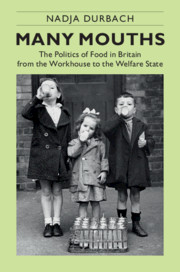Book contents
- Many Mouths
- Many Mouths
- Copyright page
- Dedication
- Contents
- Figures
- Acknowledgments
- Introduction
- 1 Old English Fare
- 2 Gendered Portions and Racialized Rations
- 3 Famine, Cooked Food, and the Starving Child
- 4 Tommy’s Tummy
- 5 The Science of Selection
- 6 Every Sort and Condition of Citizen
- 7 Nations Out of Nurseries, Empires into Bottles
- Conclusion
- Notes
- Bibliography
- Index
4 - Tommy’s Tummy
Provisioning POWs during World War I
Published online by Cambridge University Press: 27 March 2020
- Many Mouths
- Many Mouths
- Copyright page
- Dedication
- Contents
- Figures
- Acknowledgments
- Introduction
- 1 Old English Fare
- 2 Gendered Portions and Racialized Rations
- 3 Famine, Cooked Food, and the Starving Child
- 4 Tommy’s Tummy
- 5 The Science of Selection
- 6 Every Sort and Condition of Citizen
- 7 Nations Out of Nurseries, Empires into Bottles
- Conclusion
- Notes
- Bibliography
- Index
Summary
The British government’s role in feeding British prisoners of war (POWs) during World War I are the subject of Chapter 4. It investigates the widespread uncertainty around whether British POWs were starving in the German camps and the troubling questions this raised about whom was ultimately responsible for their maintenance. This stimulated debate about how to provision them adequately within international agreements, how to evaluate objectively what constituted a sound diet, and what food was culturally acceptable to prisoners and their governments. This chapter argues that throughout the war the British government often made surprisingly impractical and costly decisions around the provisioning of their own POWs. Its agencies often acceded to the requests of combatant and civilian prisoners who manipulated charitable food aid and called on their government to supplement their rations with British food products. Far from following recent advances in the nutritional sciences, such as the identification of calories and the nutritive components of food, this chapter reveals that the British state privileged these demands for familiar, comforting foods. This chapter reveals that the state’s actions can only be explained by unpacking shared, cultural meanings around food that were far from irrelevant in the context of the war.
- Type
- Chapter
- Information
- Many MouthsThe Politics of Food in Britain from the Workhouse to the Welfare State, pp. 114 - 145Publisher: Cambridge University PressPrint publication year: 2020

